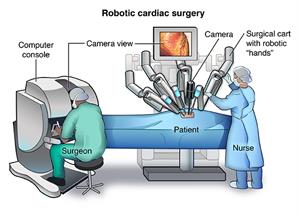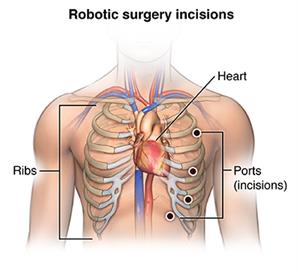Robotic-Assisted Cardiac Surgery
What is robot-assisted cardiac surgery?
Robot-assisted cardiac surgery is heart surgery done through very small cuts (incisions) in the chest. A surgeon uses tiny instruments and robot-controlled tools to do heart surgery in a way that is much less invasive than open-heart surgery. This surgery is often called robotic cardiac surgery.

Robot-assisted surgeries have been used for many types of heart-related procedures. These include valve surgery, coronary artery bypass, cardiac tissue ablation, heart defect repair, and tumor removal.
Why might I need robot-assisted cardiac surgery?
The main benefit of robot-assisted cardiac surgery is that it's less invasive compared with open-heart surgery. That can mean smaller incisions, less time in the hospital, faster healing, and returning to activities more quickly.
It also has fewer risks than open-heart surgery. The surgeon doesn't have to cut through the breastbone to open your chest. This removes many of the complications of open-heart surgery.
Your doctor will decide if robot-assisted cardiac surgery is right for you. It may be used to:
-
Repair or replace stiff or leaky heart valves.
-
Correct atrial fibrillation, a common type of arrhythmia.
-
Remove a tumor in the heart.
-
Treat heart conditions you were born with (congenital).
-
Bypass blocked arteries (coronary artery bypass surgery).
Your doctor may have other reasons to advise robot-assisted cardiac surgery.
What are the risks of robot-assisted cardiac surgery?
Even though robot-assisted cardiac surgery has benefits, there are some risks, as with any kind of surgery. Risks can include:
In some cases, your doctor may not be able to complete the surgery with the robot. If this happens, you would need open-heart surgery. You may have other risks, based on your specific medical condition. Talk with your doctor about any concerns you have before your procedure.
How do I get ready for robot-assisted cardiac surgery?
Your doctor will want to see if you're a good candidate for this procedure. They'll review your health history and lifestyle, as well as the overall severity of the disease.
-
Your doctor will explain the procedure to you. Ask them any questions you might have.
-
You'll be asked to sign a consent form. This gives your permission to do the procedure. Read the form carefully and ask questions if something is unclear.
-
Along with a full health history, your doctor may do a physical exam. This is to make sure you're in otherwise good health before you have the surgery. You may also have blood tests and other diagnostic tests.
-
Your doctor may advise taking an aspirin before the procedure.
-
Tell your doctor right away if you're pregnant or think you may be.
-
Tell your doctor:
-
If you're sensitive to or are allergic to any medicines, latex, iodine, tape, contrast dyes, and anesthesia (local or general).
-
About all prescribed and over-the-counter medicines, vitamins, herbs, and other supplements that you're taking.
-
If you have a history of bleeding disorders or if you're taking any blood-thinning medicines (anticoagulants), aspirin, or other medicines that affect blood clotting. You may need to stop taking these medicines before the procedure. Pay attention to which medicines to stop before surgery and when.
-
If you have a pacemaker or other implanted heart device.
-
If you smoke, stop smoking as soon as possible before the procedure. This will improve your overall health and your chances for a successful recovery from surgery.
-
Follow any directions you're given for not eating or drinking before the procedure.
Based on your health condition, your doctor may have other instructions for you.
What happens during robot-assisted cardiac surgery?
Talk with your doctor about the details of your procedure. The following is an example of what most likely will occur during robot-assisted cardiac surgery.

-
A doctor will give you anesthesia before the procedure starts. This will cause you to sleep deeply and not feel pain during the surgery. You may receive a sedative before the procedure to help you relax.
-
Once you're asleep, a breathing tube will be inserted through your throat into your lungs. You'll be connected to a machine (ventilator) that will breathe for you during the surgery.
-
A surgeon will make a series of keyhole-sized cuts on the side of your chest. These cuts will align with the openings between your ribs.
-
You may need to be placed on the heart-lung machine for the procedure.
-
Depending on the procedure being done, your surgeon will insert several precision-guided robotic arms into these incisions.
-
These robotic arms hold and manipulate tiny instruments to do the required tasks on the heart or surrounding arteries.
-
A tiny video camera will be inserted into another incision. This will provide a magnified, 3-D image of the operating site.
-
The surgeon will control the robotic arms and camera from a console in the operating room.
-
Once complete, the surgeon will remove the tools and close the incisions.
Talk with your doctor about what you will experience during your procedure.
What happens after robot-assisted cardiac surgery?
Once the surgery is done, you'll be moved to the recovery area to be watched. You can expect to have a fairly short hospital stay after this procedure. It's usually half as long as that after usual open-heart surgery. Your doctor will likely discharge you once you meet all of the following:
-
Your pain is under control.
-
You can keep liquids down without nausea and vomiting.
-
Your lab tests appear near normal or near your baseline before the procedure.
Make plans to have someone give you a ride home from the hospital.
You can also expect less scarring on your chest. Open-heart surgery may leave a 10-inch scar on your chest. Robot-assisted cardiac surgery just leaves a few smaller scars on the side of your chest.
After being discharged from the hospital, most people can manage their pain with over-the-counter pain relievers like acetaminophen or ibuprofen. Pain also tends to go away much faster than with open-heart procedures. Remember to take all of your medicines as prescribed.
Your incisions need to be kept clean and dry. Don't use powders, lotions, or ointments on the incisions. Using these can irritate the skin. This can make the healing process take longer. It can also increase the risk for infection. Don't soak the incisions in water until your doctor says it's okay.
You may also go back to normal activities more quickly than you would after open-heart surgery. Most people can resume their normal activities after a few weeks. Your doctor will provide specific advice for activity.
Your doctor will schedule follow-up appointments to check your progress. Tell them right away if any symptoms occur after the procedure, such as chest pain or discomfort. Complications are rare after robot-assisted heart surgery. But they can happen. So it's important to carefully watch out for any symptoms and report them to your doctor.
Next steps
Before you agree to the test or the procedure, make sure you know:
-
The name of the test or procedure.
-
The reason you are having the test or procedure.
-
What results to expect and what they mean.
-
The risks and benefits of the test or procedure.
-
What the possible side effects or complications are.
-
When and where you are to have the test or procedure.
-
Who will do the test or procedure and what that person’s qualifications are.
-
What would happen if you did not have the test or procedure.
-
Any alternative tests or procedures to think about.
-
When and how you will get the results.
-
Who to call after the test or procedure if you have questions or problems.
-
How much you will have to pay for the test or procedure.